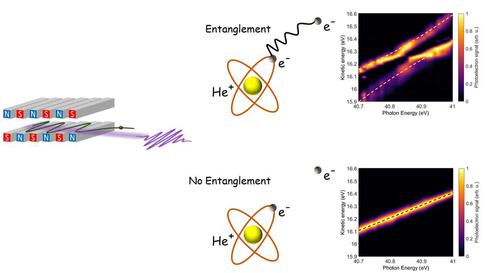XFEL: Albert Einstein would have rubbed his eyes
https://www.xfel.eu/e35178/e35455/e35456
https://www.xfel.eu/news_and_events/news/index_eng.html
news
news
news
eng
1
1
10
both
0
1
%Y/%m/%d
Press-Release
eng
 Quantum entanglement between the degrees of freedom encountered in the classical world is challenging to observe due to the surrounding environment. To elucidate this issue, a team of scientists including Michael Meyer, Leading Scientist and Group Head of SQS investigate the entanglement generated over ultrafast timescales in a bipartite quantum system comprising two massive particles: a free-moving photoelectron, which expands to a mesoscopic length scale, and a light-dressed atomic ion, which represents a hybrid state of light and matter.
Quantum entanglement between the degrees of freedom encountered in the classical world is challenging to observe due to the surrounding environment. To elucidate this issue, a team of scientists including Michael Meyer, Leading Scientist and Group Head of SQS investigate the entanglement generated over ultrafast timescales in a bipartite quantum system comprising two massive particles: a free-moving photoelectron, which expands to a mesoscopic length scale, and a light-dressed atomic ion, which represents a hybrid state of light and matter.
2024/04/22
Back
Albert Einstein would have rubbed his eyes
Paper on Science Advances with contribution of European XFEL
Generation of entanglement using a short-wavelength seeded free-electron laser

Download [204KB, 1262 x 712]
Although Albert Einstein dismissed entanglement as 'spooky' the photoelectric effect, for which he got the Nobel Prize, presents a unique opportunity to study quantum entanglement.
Although Albert Einstein dismissed entanglement as 'spooky' the photoelectric effect, for which he got the Nobel Prize, presents a unique opportunity to study quantum entanglement.
Although the photoelectron spectra are measured classically, the entanglement allows revealing information about the dressed-state dynamics of the ion and the femtosecond extreme ultraviolet pulses delivered by a seeded free-electron laser. The observed generation of entanglement is interpreted using the time-dependent von Neumann entropy. The results unveil the potential for using short-wavelength coherent light pulses from free-electron lasers to generate entangled photoelectron and ion systems for studying “spooky” action at a distance.
The study was led by Saikat Nandi from the Institut Lumière Matière, CNRS in Lyon. Read more: https://www.science.org/doi/10.1126/sciadv.ado0668
